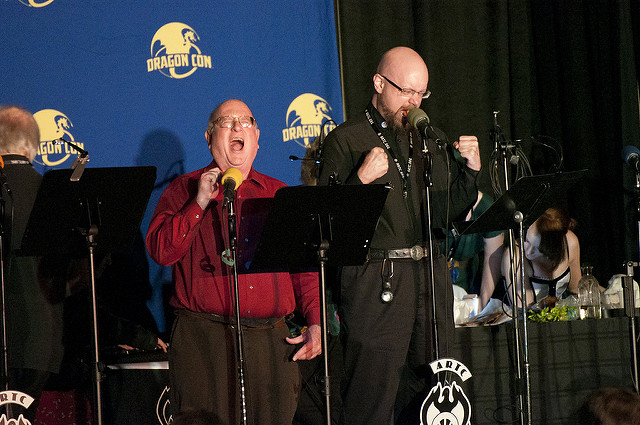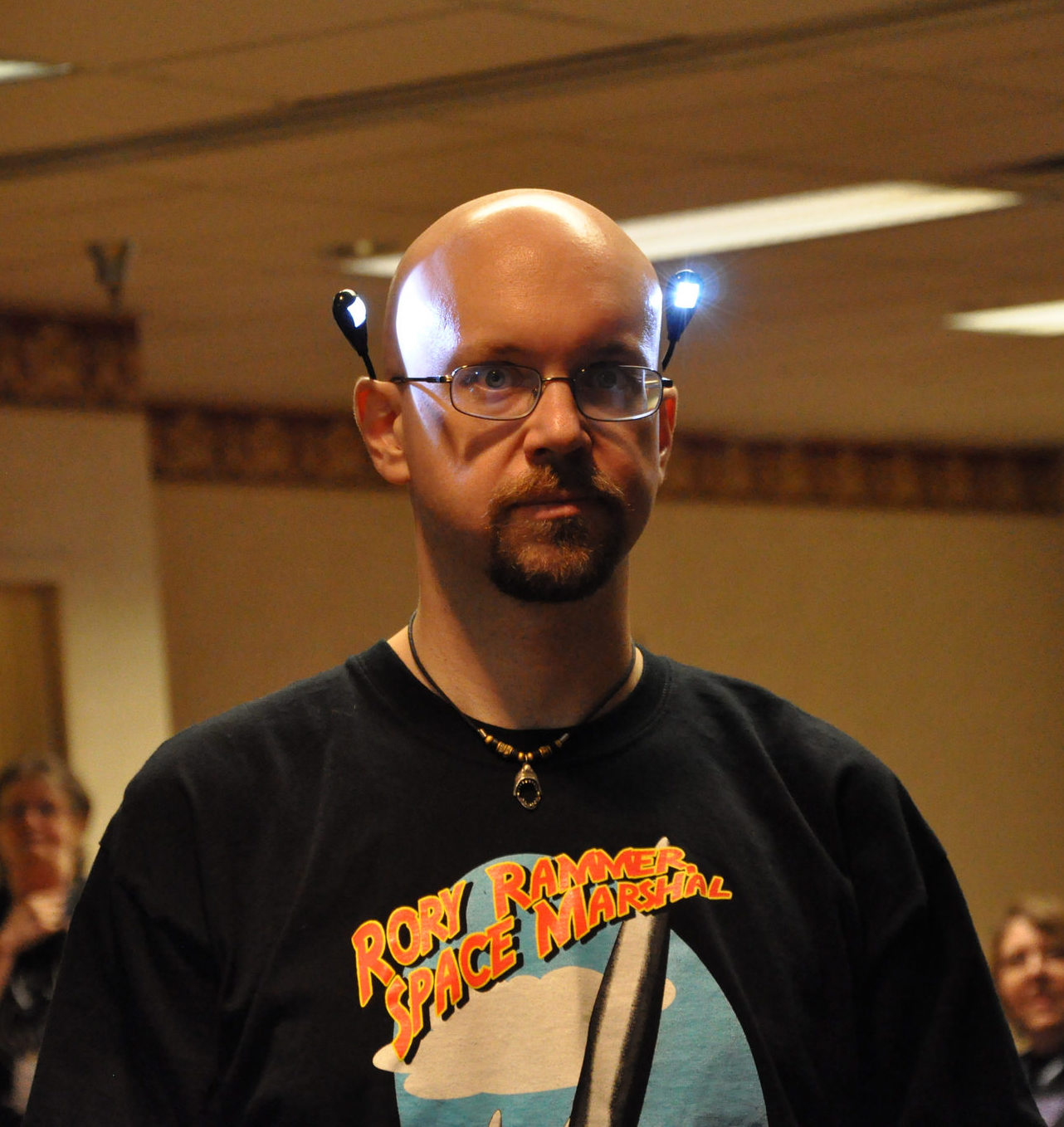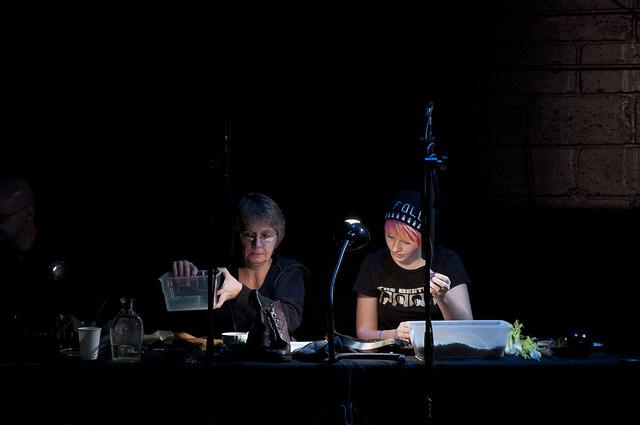Nerdier than the McConaissance and less jarring than certain recent political shakeups is the sharp change in podcast listening over just the past couple of years. Owing much to breakout hits like Serial and Welcome to Nightvale, the podcastaissance has affected the way we consume news, learn, and entertain ourselves. It has also affected the fate of today’s featured nonprofit, Atlanta Radio Theatre Company. Though the Company’s been around for 30 years, and has podcasted for more than 10, podcasts’ rising popularity has gone a long way toward building this Atlanta non-profit’s reputation on a national scale. Last week I spoke with David Benedict the full-time Vice President of ARTC (“artsy”), .
a dragoncon meet cute
David has been in theatre since high school. After college, he left the stage moved to the “front of house” to manage local theatres. While he loved storytelling, his commitment to stage performing was lukewarm. Until Dragoncon 1994.
At the”the world’s largest sci-fi/fantasy convention,” David saw ARTC’s performance listed in the program. That year they were doing an adaptation of the HG Wells’s Island of Doctor Moreau, a story about a scientist attempting to surgically turn animals into humans.
“They did a lot of really good acting,” David said. “What really drew me in was that they had live sound effects.”

ARTC creates story presentations in style of radio drama but still perform on stage. All actors hold scripts, and costumes are spare, but there is a live audience. What viewers lose in blocking they gain in film-quality sound design – forks clinking against plates, doors sliding open and clicking shut, mood music and cats purring.
“After they did the show I went over and asked ‘how do you join this thing?’ and the guy was like ‘no one has ever asked us that,'” David said.
But for David, this performance style was a perfect fit.
“I’ve had an unusual relationship with my body,” he said. “Being able to perform just with my voice appealed to me.”
He also liked the technical side of ARTC’s art form – the sound effects and working with musicians. Now, more than 20 years later, David is an ARTC leader. He recently left a job at the Georgia Aquarium to commit full-time to the organization.
“I’m in a position where I’m making sacrifices so I can do this and grow it into something more lucrative,” he said. “But I’m having a lot of fun.”

the cost of podcasting
While horror, sci-fi and fantasy are their “bread and butter,” ARTC performs stories from almost any genre.
“We’ve done romances. Comedies. Adventuries. Detective [stories],” David said. “HP Lovecraft is of course very popular, and that’s probably next in the queue, because that will be a very viable product.”
For while it’s a non-profit, the Company can’t completely succumb to the whims of its writers’ muses. The downside of the podcastaissance is that it’s not inherently profitable – money comes from advertising or product sales. ARTC has seen a boost in its listener base in the past few years, and the advent of Patreon – a startup that allows artists to raise money from their fans – has helped cover their basic costs, but not much else. So the Company also sells popular performances on audible.com and in DVDs to make ends meet.
“We’d love sponsors on the podcasts or on our live performances,” David said, adding that they hadn’t yet seen much interest from corporate sponsors. “We could name off special pieces of equipment, such as ‘the mixing board was brought to you by…’ ‘the snake was brought to you by…'”
The snake is a piece of audio equipment, unfortunately.
At the end of each podcast, David tells listeners that the most powerful gift they can give ARTC is to tell friends and family about the Company. Even if the listener isn’t in a position to donate, a friend or family may be.
recruiting by ear
New “Davids” come to the Company in a variety of ways. But their recruiting tactics have grown since Dragoncon ’94.
“There’s a surge in appreciation of good storytelling,” David said. But, he added, audio drama is still not yet produced on a mass scale. In order to grow, ARTC has gotten creative with their recruitment techniques.
“For many years, at live performances we’d say ‘if you’re interested in joining, come on in.’ [But] in the last year, we’ve started hitting up local music and audio engineering schools,” he said.
Since spoken word isn’t a major sector of the sound industry, many of these students are trained exclusively in music.

“Actors are a dime a dozen,” David added. “Especially here in Atlanta, now that the film industry is doing so well. What I need are audio engineers, producers, directors, foleys- people interested in producing their own sound effects.”
Those who have garnered an acting position with the Company are not all professionally trained either. Some are stage actors, and others are film, David said. Still others do radio theatre as a hobby. One of ARTC’s best actors is a civil engineer by day.
Still, there’s a certain je ne sais quoi that binds ARTC’s members. Beyond the sound effects and the theatre style, its members share a passion for stories a bit beyond the traditional. When I asked about his favorite performance of the past 30 years, David picked three – the monster in The Passion of Frankenstein, the title character in Rory Rammer, Space Martial (a series set in the 1980’s as viewed from the 1950’s) and the following:
“We have this piece called All Hallows None, an occult western set on the night before a town becomes a ghost town” he said. “A woman comes in out of the rain and says the devil is chasing her. I once played Absolom Sloan – the devil.”
ARTC, may the podcastaissance be with you.



